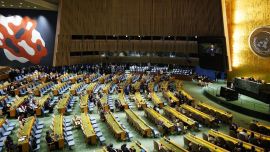In today’s 24/7 news cycle, stories may come and go. Crises can go from dangerous to deceiving in the blink of an eye. Yet some moments, some stories, can seem to be quite literally history in the making. This week’s vote in the Lower House seems to have been one of those occasions, with the scenes witnessed outside Congress as the final tally became known a moment that tens of thousands of campaigners will remember forever. Yet while blue scarves were commiserating and green scarves were waving, held aloft with joy, it is too early for either side to come to terms with defeat or cry victory. This delicate issue must still clear the Senate. If Thursday’s 129-125 approval of the abortion bill — which followed an exhaustive debate lasting almost 24 hours — teaches us anything, it’s that an outcome can change in the blink of an eye.
In a nation that is overwhelmingly Catholic but at the same time progressively inclined, the legalisation of abortion was a key debate that had to happen. Allowing for several interest groups to engage in a multi-faceted debate of ideas is simply what democracy is all about. Yet rather than go into the rights and wrongs of the numerous arguments presented by both sides in the endless debate, it might be more useful and interesting at this juncture to look at the next stage of the battle that lies ahead.
At first sight Senate passage might seem almost a formality — it would certainly take boldness for 72 provincial representatives to defy the verdict of a Lower House representing the popular vote and a growing social acceptance of abortion, while the leaders of the two main caucuses have already pronounced themselves in favour. Yet that Lower House vote was too close for comfort for pro-choice campaigners – and while the immediate explanation can be found in the switch by half-a-dozen deputies, turning what looked like defeat by a couple of votes into a razor-thin victory, the underlying cause of that closeness is geography. Opinion polls have shown abortion to be favoured by the majority of those who live Buenos Aires city and province, with almost half the Argentine population while inland provinces are opposed with a couple of exceptions like Rìo Negro. In the Lower House, the ‘Buenos Aires half’ of the country has only 95 of the 257 deputies but interestingly, that picture is far more uphill in the Senate with only six of the 72 seats. Moreover, the control of governors and even caucus leaders is often overrated as Macri has found to his cost – inland senators might just respond to their constituencies over other factors. It would be a supreme irony if Senator Cristina Fernández de Kirchner (whose concept of human rights up to now has extended to the unborn, thus explaining the absence of this legislation during 12 years of a Kirchnerism which now enthusiastically embraces this cause) ended up casting the deciding vote one way or another.
This highly existential issue clearly transcends party lines. For some, the closeness of Thursday’s vote is unsatisfactory for such a sensitive issue involving conflicting rights, whatever one’s opinion – it might be asked, as we have before, whether a referendum as in Ireland (where two-thirds favoured abortion) is not the best way of deciding this question. The Macri administration was highly ambiguous too – it took the initiative in launching this debate while most of its leading figures (including the president, Buenos Aires Province Governor María Eugenia Vidal and City Mayor Horacio Rodríguez Larreta) pronounced themselves “in favour of life.” The reason for this schizophrenia is Macri’s anxiety to insert Argentina into the modern world (where abortion is overwhelmingly legal) while also needing to respond to a conservative core constituency.
As the bill moves onto the Senate – where Miguel Pichetto, has already anticipated he expects a positive vote — we should hope that similar scenes will be witnessed. In an Argentina where almost every issue has resulted in gridlock due to the harrowing polarisation that has taken over — increasingly an international phenomenon, we should note too — it was heartening to observe a true parliamentary debate that cut through party lines, no matter how much dismay that may cause among some in the ruling coalition.


















Comments